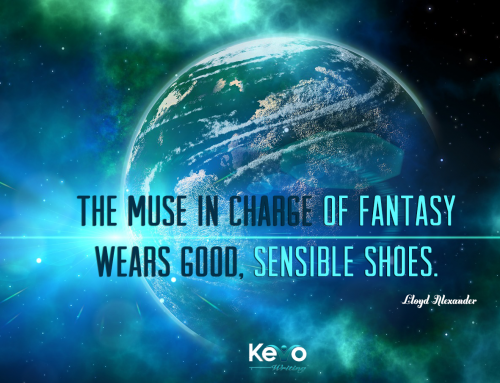When you’re a writer, the Internet is your best friend and the bane of your existence. It can either swallow your time with social media, funny comics, and news or it can help you research, learn, and grow more than you thought possible. It’s all about how you spend your time online.
Let’s be brutally honest for a second. Getting distracted by the Internet is probably more likely. It’s just so easy. But, when you know where to go, it’s a resource like no other. I’ve compiled my 10 favorite resources for writers to keep you from getting distracted and to help you out.
Resources for Story Telling
First, I want to give you my favorite resources for crafting your story. Whether you’re writing a short story, novel, or something in between, these websites are sure to offer you insight, encouragement, and lots of help.
If you write in the fantasy, science fiction, or horror genre, this is a fabulous website. You can try it out free for 30-days, and if you decide you like it, it’s just $49 for a year. Basically, it’s an online forum just for writers. You can post your own story in 7,500-word chunks and receive detailed feedback from the community. However, this is not just any workshopping website; you can actually go line-by-line for detailed reviews that help you grow as a writer and story-teller.
2. Helping Writers Become Authors
Now, this website is awesome! K.M. Weiland offers a ton of amazing advice on her blog. In particular, her “How to Structure Your Story” and “How to Write Character Arcs” series are amazingly insightful. If you’re at all interested in outlining your novel and growing your story-telling ability, then this website is for you. I’ve spent hours digging into the blog series to glean more insight into my novel, and it has most definitely helped.
Live Write Thrive is a fabulous website with a little bit of everything. You could dig around for weeks and still find more tidbits and tips to help. My personal favorite resource is C.S. Lakin’s post on “Master the Passage of Time in Novel Scenes.” Personally, sometimes I get stuck in my scenes because I’m just not sure how to deal with the time element. Should the scene be a few minutes, a few hours, a few days? How can I best use time to make a big impact? Time and scene creation is vital and this blog, in particular, is great.
4. StoryFix 2.0
This was the first website I found when I decided that I had to start outlining my novel. Before finding StoryFix 2.0, I was a fly-by-the-seat-of-my-pants writer. I would just start writing and let the story tell itself. I believed that my characters revealed the story as I went. Well, while that might have some truth, it’s far from reality. Larry Brooks’ “Story Structure Series” is enlightening, helpful, and powerful. If you’ve never broken down your novel into its seven parts before, take a look:
- Insighting Incident
- First Plot Point
- First Pinch Point
- Mid-Point
- Second Pinch Point
- Second Plot Point
- Climax
This is a FUN website. Let’s get real, coming up with character names can be a challenge. Particularly, when you’re looking for something unique or that fits specific criteria. Instead of going onto baby name websites and trying to match first names with surnames, use the Fantasy Name Generator. You can find everything from witch and elf names to names that suit places, cultures, and more. There’s literally a list for anything you can imagine, and it will not only save you time, it will be a great diversion.
Resources for Freelance Writers
Okay, so let’s say you’re not writing a novel—or you do that on the side—but to make your bread and butter you’re a freelance writer. Well, there are some great resources out there for you, too.
If you don’t head onto this website a few times a week to find new jobs, you’re missing out. This isn’t a job board like so many other freelance websites that makes you bid on jobs for pennies on the dollar. No, these jobs will actually pay you a working wage. You’ll still be up against some stiff competition, but I’ve found quite a few jobs on this website, and those jobs have stuck around for months. Be patient and check often.
This is another great job website. My best advice, sign up for the daily newsletter. Brian Scott, who used to own and work FreelanceWriting.com, has a new website with the same great jobs. Brian is a master at collecting the best writing jobs from around the web and sending them out to his email subscribers. You’ll typically find two or three jobs a day that interest you and, many, pay well.
Not everything on this website is gold, but the PDF “How Much Should I Charge” is platinum! If you’re in any type of freelance field, this PDF contains a veritable gold mine of information. You can determine how much your services are worth and then offer competitive rates when applying to jobs. I’ve used this to determine my rate for website copy, article creation, social media, and more.
9. Quick Sprout
I love the blog, “The Day After: 11 Things to do After You Publish a Post.” If you struggle to gain traction on your personal blog, company blog, self-published articles, or any content, this blog is for you. It gives you step-by-step, detailed instructions about everything you need to do to make sure your content is consumed and seen as it should be.
10. Pixabay
I ADORE this website. I don’t know about you, but I don’t always want to pay money for artwork. Pixabay has thousands of pictures on their website, for free. Plus, the website is growing all the time. You can find images to match almost any blog post or article, and you don’t have to pay a dime or offer attribution. I use Pixabay for all my clients and my personal blog. It’s simple to use, and the variety is great.
Conclusion
There are hundreds of more resources available on the web, and you probably already have a few of your own favorites. Let me know what websites you use in the comments and if you’ve ever used any on this list.





















